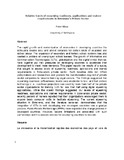Please use this identifier to cite or link to this item:
http://hdl.handle.net/10311/1046Full metadata record
| DC Field | Value | Language |
|---|---|---|
| dc.contributor.author | Nleya, P.T. | - |
| dc.date.accessioned | 2012-11-15T12:47:40Z | - |
| dc.date.available | 2012-11-15T12:47:40Z | - |
| dc.date.issued | 2009 | - |
| dc.identifier.citation | Nleya, P.T. (2009) Relative levels of elarning readiness, applications and trainee requirements in Botswana's private sector, Canadian Journal of Learning and Technology, Vol. 35 No. 1, pp. 1 - 19 | en_US |
| dc.identifier.issn | 1499-6685 | - |
| dc.identifier.uri | http://hdl.handle.net/10311/1046 | - |
| dc.description.abstract | The rapid growth and modernization of economies in developing countries like Botswana creates new and unmet demands for certain kinds of educated and skilled labour. The expansion of secondary and tertiary school systems has also created a problem of unemployed school leavers. The growth of Information and Communication Technologies (ICTs), globalization and the digital divide likewise, have together put new pressures on developing countries to accelerate their development to meet these demands. This paper reports the results of a survey that sought to assess levels of eLearning readiness, applications and trainee requirements in Botswana’s private sector. Such baseline data can inform policymakers and researchers and promote the transformation required of private sector companies to become learning organizations. The findings suggested that eLearning readiness (eReadiness) levels were moderate to low, and that archaic technology (i.e., overhead projection) was used by more than half of the private sector organizations for training (with far less than half using digital eLearning applications). While the overall findings suggested low levels of eLearning readiness, applications and trainee requirements in Botswana’s private sector, seventy percent of trainers reported that their organizations encouraged them to acquire basic computer skills to facilitate eLearning. The current eLearning situation in Botswana, and the literature reviewed, demonstrates that the integration of ICTs in both developing and developed countries was a gradual process. Public-Private Partnerships (PPPs) have expedited the change process in developed countries. However, several limitations are associated with such partnerships and this renders lessons for developing countries to emulate. | en_US |
| dc.language.iso | en | en_US |
| dc.publisher | Athabasca University Press, http://www.aupress.ca/index.php | en_US |
| dc.subject | Educational technology | en_US |
| dc.subject | Internet | en_US |
| dc.subject | Information technology | en_US |
| dc.subject | Computer uses in education | en_US |
| dc.subject | Electronic learning | en_US |
| dc.title | Relative levels of eLearning readiness, applications and trainee requirements in Botswana’s private sector | en_US |
| dc.type | Published Article | en_US |
| dc.link | http://www.cjlt.ca/index.php/cjlt/article/view/511/241 | en_US |
| Appears in Collections: | Research articles (Dept of Educational Foundations) | |
Files in This Item:
| File | Description | Size | Format | |
|---|---|---|---|---|
| Nleya_CJLT_2009.pdf | 2.57 MB | Adobe PDF |  View/Open |
Items in DSpace are protected by copyright, with all rights reserved, unless otherwise indicated.
